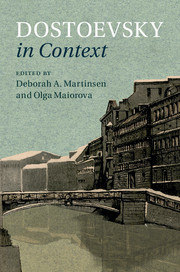Book contents
- Frontmatter
- Contents
- List of illustrations
- Notes on contributors
- Acknowledgments
- Note on citation, transliteration, glossary, and dates
- Chronology
- 1 Introduction: the many worlds of Dostoevsky
- PART I SOCIAL, HISTORICAL, AND CULTURAL CONTEXTS
- i CHANGING POLITICAL, ECONOMIC, AND SOCIAL LANDSCAPE
- 2 The Great Reforms and the new courts
- 3 The abolition of serfdom
- 4 Punishment and crime
- 5 Socialism, utopia, and myth
- 6 Nihilism and terrorism
- 7 The “woman question,” women's work, women's options
- 8 The economy and the print market
- ii POLITICAL, SOCIAL, AND CULTURAL INSTITUTIONS
- iii SPACE AND PLACE
- iv RELIGION AND MODERNITY
- PART II LITERATURE, JOURNALISM, AND LANGUAGES
- Glossary
- Further reading
- Index
- References
2 - The Great Reforms and the new courts
from i - CHANGING POLITICAL, ECONOMIC, AND SOCIAL LANDSCAPE
Published online by Cambridge University Press: 18 December 2015
- Frontmatter
- Contents
- List of illustrations
- Notes on contributors
- Acknowledgments
- Note on citation, transliteration, glossary, and dates
- Chronology
- 1 Introduction: the many worlds of Dostoevsky
- PART I SOCIAL, HISTORICAL, AND CULTURAL CONTEXTS
- i CHANGING POLITICAL, ECONOMIC, AND SOCIAL LANDSCAPE
- 2 The Great Reforms and the new courts
- 3 The abolition of serfdom
- 4 Punishment and crime
- 5 Socialism, utopia, and myth
- 6 Nihilism and terrorism
- 7 The “woman question,” women's work, women's options
- 8 The economy and the print market
- ii POLITICAL, SOCIAL, AND CULTURAL INSTITUTIONS
- iii SPACE AND PLACE
- iv RELIGION AND MODERNITY
- PART II LITERATURE, JOURNALISM, AND LANGUAGES
- Glossary
- Further reading
- Index
- References
Summary
The Russian is either above law or below it – never, or rarely capable of appreciating law for its own value as an ethical minimum, or as a necessary mediation between the kingdom of God and the animal struggle for life.
George P. Fedotov, The Russian Religious MindWhen Fyodor Dostoevsky returned from Siberia in 1859, Russia was in the midst of the change and ferment of the era of Great Reforms. The failure of Russia's armies to resist a small expeditionary force of French and British troops in the Crimea had not only cost thousands of lives and mass suffering; it had also discredited the claims of Nicholas I (1825–55) for Russia's power and invincibility. The war revealed a state riddled with corruption that belied the image of a monarchy operating according to law for the interests of its citizens. In 1855, Pyotr Valuev, the Governor of Kurland Province, wrote, “The distinctive features of our government consist in a ubiquitous absence of truth.” He lamented that the system was the embodiment of hypocrisy: “On the surface there is glitter. Beneath there is rot.”
In 1856, Alexander II (1855–81) reluctantly assented to the Treaty of Paris, which barred the Russian fleet from the Black Sea, a concession that he regarded as a disgrace. His manifesto on the Treaty's signing announced a shift in goals, from contending with foreign powers to coping with Russia's internal problems: “May the domestic order be strengthened and perfected; may justice and mercy rule in [Russia's] courts […] and may each, under the canopy of laws equally just for all, equally protective of all, enjoy the fruits of honest labor in peace.” Alexander II's statements expressed an idealized vision of liberalized institutions coexisting with authoritarian rule, a vision inspired by hope for a conservative consensus with a stake in society. Embarking on the Great Reforms – the emancipation of the serfs, the reforms of the courts and local government, and the abolition of corporal punishment (but not for the peasantry!) – Alexander II sought to enlist the sympathy of educated society. He initiated discussions of change in the government and the press and introduced a policy of openness, glasnost’. Openness allowed him, first, to gain allies among supporters of reform, and second, to acquire information about the rural situation that was lacking in the closed world of Nicholas I's Russia.
- Type
- Chapter
- Information
- Dostoevsky in Context , pp. 13 - 21Publisher: Cambridge University PressPrint publication year: 2016



